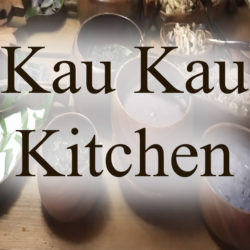Frequently called “a Hawaiian Renaissance women,” Leilehua Yuen is most noted for her versatility in Hawaiian culture and arts. She explains:
“My life goal is to develop the entire skill set of a wahine makaʻāinana, a lands-woman of the pre-European contact era. Those women made the clothing for their families, farmed and caught healthful foods for them, practiced herbal medicine, and created beautiful works of art. I want to learn what they knew.”
An author, artist, and educator, Leilehua has been dedicated to the study and perpetuation of Hawaiian culture since childhood. Raised in Hilo and Puna by her grandparents, Henry and Thelma Yuen, Leilehua learned many of the old ways from them.
“My grandparents were very traditional,” she says. “I was trained for my role in life, and even though I tried to escape in my teens and twenties, I had to return.”
When Leilehua was born, Hawai`i was a territory of the United States. When her grandmother was born, it was still an independent republic. When her great-grandfather Yuen emigrated from China to Hawai`i, it was a monarchy. The Hawaiian woman he married listened to her grandparents speak of the days when each island of Hawai`i was ruled by independent chiefs.
Leilehua’s Tutu Kane (grandfather) Henry was a Western-trained MD, and may have been the first Native Hawaiian MD to practice on the Big Island. He also was extremely knowledgeable in the herblore of old Hawai`i. He was a native speaker of the Hawaiian language and had been born and reared on Kaua`i. Leilehua learned from him about plants, philosophy, and the health of the kino (body).
“He was a gracious gentleman. Even today, I often meet people who remember him fondly. They tell me the greatest anecdotes about him,” Leilehua says.
Tutu Wahine Thelma was a homemaker and fine amateur artist, and taught Leilehua lei making, hula, storytelling, and other arts. Both of Leilehua’s parents are professional artists, and also trained her as she grew older. Leilehua’s formal studies are in Journalism and Fine Arts, and she earned a Certificate of Education for Ministry. Although her grandparents have passed on she continues her studies of Hawai`iana with respected island kupuna (elders).
Leilehua has been a professional writer since 1983. Her work has been published in the U.S., Canada, and Japan. Although she primarily writes magazine articles on Hawai`iana topics, she has authored four cookbooks, several booklets on various topics, and several volumes of poetry.
Her artwork has been shown at galleries around the Big Island of Hawai`i, and has been bought by locals and visitors alike. Some of her pieces have gone as far afield as Japan, China, New Zealand, Canada, Germany, and Finland.
Leilehua has performed and taught hula on the Mainland, in Europe, and in China. While in China, she performed at a banquet the Mayor of Sanya gave for a diplomatic trade mission which included dignitaries from Hawai`i, Washington DC, Hainan, and Beijing. She also was asked to craft a traditional ancient style of lei for presentation to the Mayor, and chant an oli she composed in honor of the City of Sanya and the Island of Hainan. her performance was broadcast on China’s national television.
Currently, Leilehua teaches Hawaiian culture and arts in the national parks and local Waldorf schools, runs her own halau hula (hula school), writes about various aspects of Hawaiian culture, and continues to create her art. She lives in the old family home in Hilo, where she is restoring her Tutu Kane’s garden and planting it with traditional medicinal and other herbs, food plants, and flowers. Not all of the items she needs in her work will grow in Hilo, so she rents space on a coffee farm in Kona to grow other plants, as well as to stay in when she is working on that side of the island
Leilehua strives to promote intercultural understanding between malihini – visitors and new residents – and the Hawaiian community. She believes her mixed ethnic heritage combined with her strong identification with her Hawaiian cultural background helps to accomplish this.
“Today,” she says, “so many people seem to believe they owe nothing to anyone but themselves. My grandparents taught me that duty to one’s community comes first. If the best way I can serve my community is to teach, then that is what I should be doing. . . My Tutu Kane believed the world was a garden. You can’t keep harvesting without tending it and putting something back.”
Accommodating in the old Hawaiian style, Leilehua is happy to create custom-tailored educational events for individuals and groups. Periodically, Leilehua accepts home-stay apprentices and work-study students on a case-by-case basis.
West Hawai‘i Today: Big Island Business Recognized in National Contest
Ke Ola Magazine: Living Within the Stories
Hana Hour Magazine: Lei and Black Leather
Ted-X Talk: Visioning the Future Through the Eyes of the Past

